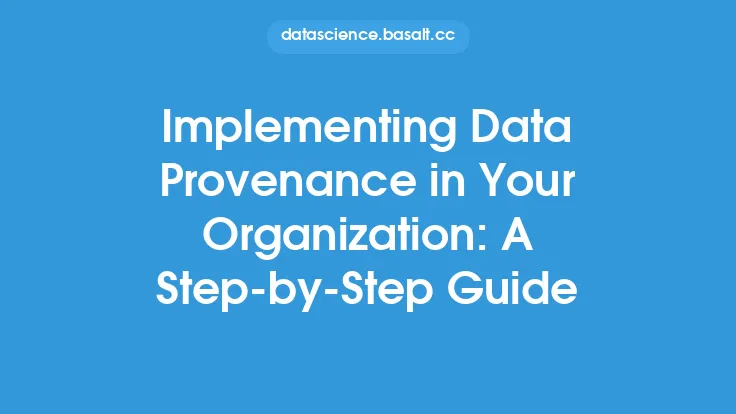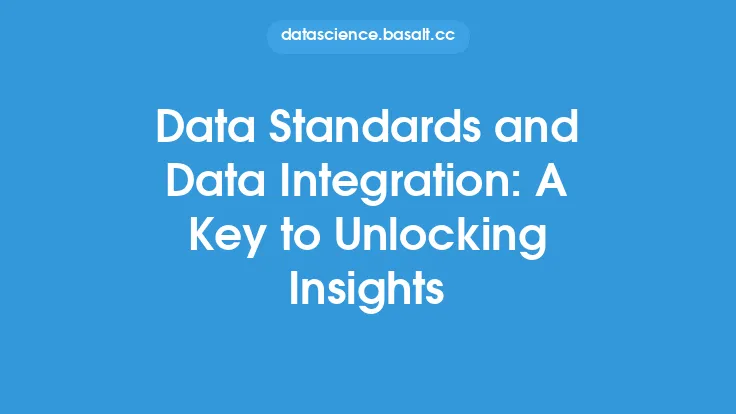Creating a culture of data standards within an organization is a crucial aspect of effective data governance. It involves establishing a set of rules, guidelines, and best practices that ensure data is accurate, consistent, and reliable across the organization. A culture of data standards is essential for making informed decisions, improving data quality, and reducing errors. In this article, we will explore the importance of creating a culture of data standards, the benefits it brings, and the steps organizations can take to establish and maintain such a culture.
Introduction to Data Standards
Data standards refer to the set of rules, guidelines, and best practices that govern the collection, storage, processing, and dissemination of data within an organization. These standards ensure that data is accurate, consistent, and reliable, and that it conforms to a specific format or structure. Data standards can be applied to various aspects of data management, including data quality, data security, data privacy, and data interoperability. By establishing data standards, organizations can ensure that their data is trustworthy, accessible, and usable, which is critical for making informed decisions and driving business success.
Benefits of a Culture of Data Standards
A culture of data standards brings numerous benefits to an organization. Some of the key benefits include:
- Improved data quality: Data standards ensure that data is accurate, complete, and consistent, which reduces errors and improves data quality.
- Increased efficiency: Data standards streamline data management processes, reduce manual errors, and improve data processing times.
- Better decision-making: Data standards provide a single, unified view of the organization's data, which enables better decision-making and improved business outcomes.
- Enhanced collaboration: Data standards facilitate collaboration and data sharing across departments and teams, which improves communication and reduces silos.
- Reduced risk: Data standards reduce the risk of data breaches, errors, and non-compliance with regulatory requirements.
Establishing a Culture of Data Standards
Establishing a culture of data standards requires a structured approach. The following steps can help organizations create a culture of data standards:
- Develop a data governance framework: A data governance framework outlines the policies, procedures, and standards for managing data within the organization.
- Define data standards: Define data standards for various aspects of data management, including data quality, data security, and data privacy.
- Establish a data stewardship program: A data stewardship program assigns ownership and responsibility for data assets to specific individuals or teams.
- Provide training and awareness: Provide training and awareness programs to educate employees on the importance of data standards and their role in maintaining them.
- Monitor and enforce compliance: Monitor and enforce compliance with data standards through regular audits, data quality checks, and feedback mechanisms.
Technical Aspects of Data Standards
From a technical perspective, data standards involve the use of various tools and technologies to ensure data consistency and accuracy. Some of the key technical aspects of data standards include:
- Data modeling: Data modeling involves creating a conceptual representation of the organization's data assets, which helps to identify relationships and dependencies between data entities.
- Data validation: Data validation involves checking data against a set of predefined rules and constraints to ensure accuracy and consistency.
- Data normalization: Data normalization involves organizing data into a standardized format to reduce data redundancy and improve data integrity.
- Data encryption: Data encryption involves protecting data from unauthorized access through the use of encryption algorithms and protocols.
- Data lineage: Data lineage involves tracking the origin, movement, and transformation of data across the organization, which helps to ensure data quality and integrity.
Challenges and Opportunities
Creating a culture of data standards is not without challenges. Some of the common challenges include:
- Resistance to change: Employees may resist changes to existing data management practices, which can make it difficult to establish a culture of data standards.
- Lack of resources: Establishing a culture of data standards requires significant resources, including time, money, and personnel.
- Complexity: Data standards can be complex and difficult to implement, especially in large and distributed organizations.
- Evolving regulatory requirements: Regulatory requirements for data management are constantly evolving, which can make it challenging to maintain compliance with data standards.
Despite these challenges, creating a culture of data standards presents numerous opportunities for organizations. Some of the key opportunities include:
- Improved competitiveness: A culture of data standards can improve an organization's competitiveness by enabling better decision-making and improved business outcomes.
- Increased innovation: A culture of data standards can facilitate innovation by providing a unified view of the organization's data assets.
- Better customer experience: A culture of data standards can improve the customer experience by providing accurate and consistent data, which enables personalized and targeted marketing.
Conclusion
Creating a culture of data standards is essential for effective data governance and management. It involves establishing a set of rules, guidelines, and best practices that ensure data is accurate, consistent, and reliable. By establishing a culture of data standards, organizations can improve data quality, increase efficiency, and reduce risk. While there are challenges to creating a culture of data standards, the benefits and opportunities it presents make it a critical aspect of modern data management. As organizations continue to evolve and grow, creating a culture of data standards will become increasingly important for driving business success and competitiveness.





